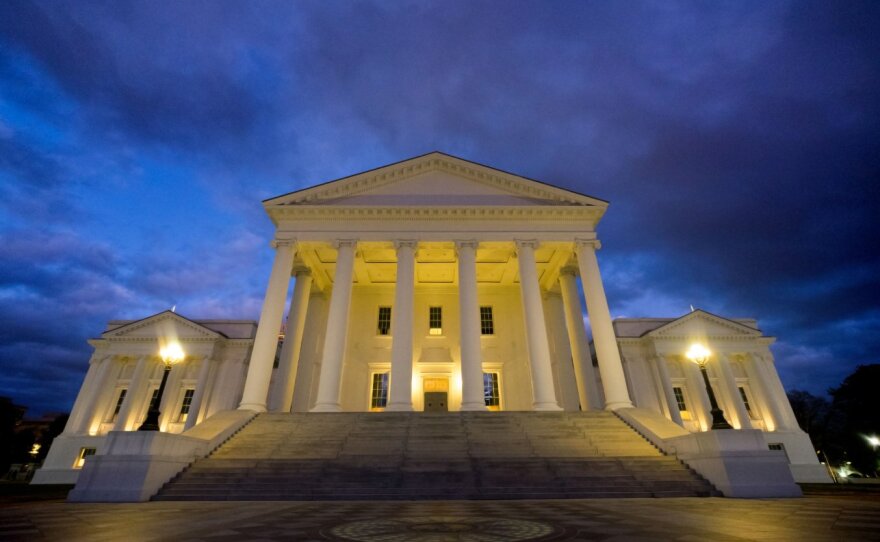The Freedom of Information Act — or FOIA — is how Americans access government documents and information. Studies show when governments are more open, there’s more confidence and less corruption and even cleaner drinking water.
As part of the VPM News segment Curious Commonwealth, a listener recently asked this question: “Attorneys have told me that Virginia has some of the weakest FOIA laws in the country. Weak FOIA laws stymie governmental transparency, which is antithetical to representative democracy. What can we do to strengthen our FOIA laws in the interest of fostering more open government at the state and local level?”
VPM News reporters Megan Pauly and Ben Paviour looked into the issue. Between them, they’ve made dozens of FOIA requests in Virginia.
Public information for the price of a used car
While journalists are always interested in obtaining public records, Virginia’s FOIA laws are also aimed at helping the general public access information about their government.
In some cases, Virginians first encounter FOIA because of a personal experience with government. That was the case for Alice Minium, a 31-year-old Richmond resident and freelance writer.
During summer 2020, Minium joined the racial justice protests in Richmond. She said she kept seeing police act in ways she felt were inappropriate.
“It was always officers who wouldn't identify themselves,” Minium said in an interview. “And I saw people get hurt.”
Minium and other activists decided to set up a website so people could find the names of officers they encountered. She called it OpenOversightVA.

When Minium started filing FOIA requests last year to build out that site, she asked all Virginia law enforcement agencies for a roster of their officers and their policy manuals. And most handed over the information with minimal fuss or expense.
But Richmond Police Department said it would cost her almost $8,000 for its manual. The department claimed it would take staff over 150 hours to redact.
“I think that's pretty common sense that that's not in good faith,” Minium said. “It shouldn't take the cost of like a used car to find out how your police department runs.”
The cost was enough to scare Minium away — at least temporarily. (The manual was later released as part of a class-action lawsuit brought by Minium and several other protesters, including former VPM News employee Roberto Roldan.)
Minium also encountered problems in Chesterfield County, where police said turning over their full roster would expose undercover officers. Minium sued; the case is currently on appeal. This year, as OpenOversightVA has gone back to localities to request updated records, Minium said more are citing that same rationale for withholding records.
"Transparency is something you have to actively fight for,” Minium said.
Virginia’s exemptions, lack of appeals
Some aspects of Virginia FOIA laws make for less government transparency compared to other states, according to David Cuillier, director of the Brechner Freedom of Information Project at the University of Florida. Cuillier said Virginia is among about one-third of states that can charge for the time it takes staff to search for and redact records — which some agencies interpret as a requirement to charge. Cuillier said that can be a “deal killer” for some.
Some states, including Alaska, have provisions in state law that either allow or require agencies to provide records at no cost if the agency determines the information is important to the public’s understanding of government workings.
Cuillier said his general sense is that about one-third of states only charge copy fees; about another third, including Virginia, specify that agencies can charge for the time it takes to search and redact records in addition to copy fees.
Moreover, when Virginia agencies don’t comply with records requests or send unreasonable cost estimates, the only recourse for requesters is to sue. There’s no mechanism for an administrative appeal like in other states, including Pennsylvania where the office of public records can review the issue and force agencies to hand over records.
In Washington state, agencies that deny records have to produce sufficient evidence outlining why they denied records — or pay up. Courts there can penalize agencies up to $100 for each day they withhold records.
“There have been judgments in Washington state that nearly bankrupted small towns,” Cuillier said. “The judge actually had to reduce the payout to save the town. That's when city attorneys and others start paying attention.
Virginia also has a few exemptions that experts said stand out as particularly bad.
Gunita Singh, an attorney at the Reporters Committee for Freedom of the Press, said perhaps the most notorious is the working papers and correspondence exemption, which applies to officials like the governor and city mayors.
“It's definitely one of the broader executive privileges in the country. And it's unfortunate that courts and agencies don't often honor the presumption in favor of disclosure,” Singh said.
Some argue the definition of “working papers” is vague. That exemption states: “those records prepared by or for a public official identified in this subdivision for his personal or deliberative use.”
Another anti-transparency exemption Singh points to is Virginia’s exemption for personnel records, which she said is particularly broad. For instance, if a FOIA request seeks records relating to a public employee’s disciplinary history, an agency may decline to release the record. The law precludes the release of records that may include “personnel information concerning identifiable individuals.”
A state Supreme Court case from last year found that Virginia is one of four states with a similar exemption and one of two states — alongside South Dakota — that haven’t defined what “personnel records” means in state law.
Singh points to other states that more narrowly define what personnel records could be withheld. For example, in California and Massachusetts personnel records can only be withheld if disclosure would constitute an unwarranted invasion of privacy.
How ‘prompt’ is Virginia in its responses?
The time agencies legally have to respond to or send records in Virginia is pretty speedy compared to a lot of other states.
Cuillier said Virginia is among about one-third of states that require record keepers to respond to requests or send records in about a week.
He said some other states give agencies a few weeks, and the remaining states have no deadlines. Instead, these states have language requiring records to be sent in a “reasonably prompt” manner. But Cuillier said the timelines outlined in FOIA laws like Virginia's are great in theory, but not always in practice.
“The reasonably prompt states are actually reasonably prompt. In general, they're faster than the ones who have deadlines,” he said.
Cuillier analyzed a sample of over 7,000 public record requests submitted to state agencies in the United States through the nonprofit organization MuckRock from 2014 through 2017. He found that compliance with requests was relatively low in Virginia compared to other states.
In Virginia, people who requested records received them less than one-quarter of the time. In Washington state, Cuillier found requesters got records two-thirds of the time they asked — even though Washington law includes the “reasonably prompt” language.
According to the analysis, only four states had a worse compliance rate than Virginia: New Jersey, Mississippi, Arkansas and Alabama.
Cuillier said Virginia’s low compliance rate could be tied to agencies charging for copy fees, as well as for search time and redactions. Additionally, the state has many exclusions in its FOIA laws. But Cuillier also cites the lack of enforcement and recourse for when agencies don’t comply with requests.
Cultures of compliance (or noncompliance)
Compliance can depend on how an individual agency interprets the law. It can also come down to personalities.
Cuillier suspects that some states have higher cultures of compliance than others. And he thinks Southern states typically have worse cultures of compliance. But this is just a theory.
Megan Rhyne, executive director for the Virginia Coalition for Open Government, said she thinks cultures of compliance vary from agency to agency within Virginia. In the cases she's helped with, Rhyne said there's often a tendency for records officers to presume records are private to begin with.
"An overwhelming majority of requests are coming or being approached from: ‘How can we keep this? Unless, I just can't find [a law to cite for an agency to withhold records], then we'll release it,‘” Rhyne said.
She said it’s also difficult to get pro-transparency legislation approved in Virginia, and every year there are proposals for more exemptions. A relatively new Virginia law does require records to be made available at the lowest possible cost and also requires agencies to ask the requester if they want a fee estimate before processing — and charging — them.
“Over the years, the batting average for more pro-FOIA kinds of bills has been terrible … . [I]t’s a lot easier to propose limitations than it is to propose taking away those limitations,” Rhyne said.
Given this landscape,experts had some suggestions for getting records requests fulfilled in Virginia. Singh said it doesn’t hurt to give the FOIA officer a call before putting in the request.
“I always encourage records requesters just to use honey rather than vinegar and engage in some degree of relationship building with the Public Information Officer,” Singh said. “Even if it's as simple as asking how their day is going or just making conversation ... and establishing that connection, especially if you're going to be a repeat requester to help just establish some credibility. You're not just a tracking number assigned to a request.”
Cuillier suggested another research-backed approach. He said strongly worded requests are also tied to higher compliance. That could mean citing the law or getting an attorney to send a letter threatening litigation.
But Cuillier suggested states should also force agencies to pay up if they don’t comply with FOIA laws. He said sometimes this is what it takes to get them to take these requests seriously.

A citizen fights UVA’s to turn over records — and wins
In June 2022, Gov. Glenn Youngkin appointed businessman Bert Ellis to the University of Virginia Board of Visitors. Ellis had attacked diversity, equity and inclusion programs at the school, and was a controversial selection.
Richmond resident Jeff Thomas wanted to learn more about Ellis' work for the board. On Aug. 22, 2022, Thomas filed a FOIA request to see Ellis’ text messages related to his role at UVA.
Thomas didn’t get a response from the university in the time required by law, so he threatened legal action. He’s not a lawyer but said the process for contesting alleged FOIA violations is pretty simple.
“It doesn't require extensive legal research. It doesn't require extraordinary effort. You just have to find this one-page form, Virginia form DC-495, which is free online,” Thomas said.
On Sept. 13, 2022, Thomas filed the form at Richmond General District Court. Almost a week later — a day before Thomas’ hearing — UVA emailed him some documents, but the text messages were heavily redacted.
“Imagine what the CIA files look like on the Kennedy assassination, and that's basically what UVA gave me — dozens of pages of black, redacted boxes with unredacted statements saying ‘Hey, how are you?’” Thomas said.
Thomas went ahead with his suit, and on Feb. 2 won the release of most of the redacted records. But he said the Attorney General's office and UVA don’t like the verdict. According to Thomas, they notified the judge that they planned to appeal.
In the meantime, Ellis’ appointment, which required approval from state lawmakers, went up for a vote in the General Assembly. He was narrowly approved on Feb. 7.
Later that month, UVA gave up on its appeal and handed over most of Ellis’ redacted texts. Their inflammatory content sparked headlines across the country and later, an apology from Ellis.
Thomas said it was worth the trouble.
“It's not chess, it's checkers, when you file a FOIA lawsuit," Thomas said. "I'm not a great public speaker. I certainly did not feel intimidated by going before a judge who just wanted to get the facts in front of her.”
A UVA spokesperson didn’t respond to a series of emailed questions about the case.
FOIA resources
In addition to advocating for pro-transparency legislation and leading trainings, Rhyne at the Virginia Coalition for Open Government is available to help everyday citizens with their requests and to educate them about Virginia’s FOIA laws.
Rhyne said over half of her calls for help navigating FOIA are from citizens, not journalists. She said there's a misconception that only lawmakers and reporters make these requests.
“So many [citizens], they get to it, and they're like, ‘They told me no, and I just don't think that's right. Now, I'm really into it!’ Whereas, I'm sure the government thought, ‘Oh, if we tell her no, she's gonna go away.’”
But Rhyne said it doesn’t always work out that way.
This story was produced as part of the VPM News series Curious Commonwealth.
Editor's note: VPM News and reporter Ben Paviour filed suit in January against the Virginia Department of Education for release of draft policies concerning transgender students. VPM News and Paviour were represented by the Reporters Committee for Freedom of the Press.
Disclosure: VPM News Director Elliott Robinson is on the board of the Virginia Coalition for Open Government.





